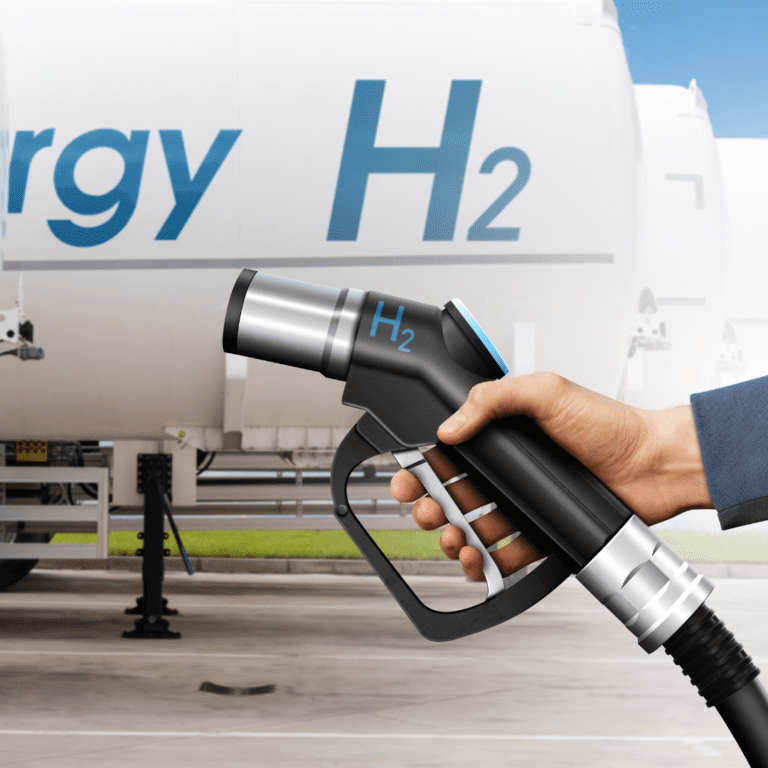A closer look at Hydrogen Fuel Cell Vehicles vs. Electric Vehicles.
In recent years, the transition from fossil fuel vehicles to electric vehicles has been increasing, driven by recognition of climate change and opting for sustainable options. While much of the conversation around zero-emission vehicles focuses on Electric Vehicles (EV), innovations in Hydrogen Fuel Cell Vehicles (FCEV) are gaining prominence.
Hydrogen-powered vehicles are similar to electric vehicles in that they both use electricity to power their engines. The key difference is that FCEVs are powered by a fuel cell that requires liquid hydrogen to generate the necessary electricity. The clean energy produced by fuel cell vehicles can make these cars more environmentally friendly due to their alternative fuel source.
In the freight transportation sector, truck manufacturers and electric vehicle startups are developing electric trucks with hydrogen fuel cells, with the goal of bringing them to market in 2030. Large North American truck manufacturers or their parent companies have trucks in different phases of development.
With prototypes in testing in the EV and cargo transportation industry already in operation, it is essential to evaluate what each type of vehicle can offer. The comparison between FCEV and EV focuses on three key aspects: sustainability, efficiency and charging.
Differences between EVs and FCEVs: sustainability, efficiency and recharging:
In terms of sustainability, FCEVs have a clear advantage by generating electricity by injecting hydrogen into fuel cells, avoiding the use of conventional batteries. Although this process emits only water, the production and storage of hydrogen poses environmental challenges.

In contrast, most EVs operate on lithium-ion batteries, which do not emit CO2 when propelling the vehicle. However, the production of these batteries increases the carbon footprint of EVs. Adopting renewable energy and solid-state batteries can reduce these emissions.
But not everything is negative, since the use of renewable energy to obtain battery materials can significantly reduce or eliminate carbon emissions. In addition, EVs provide clean energy with zero harmful emissions, being an excellent alternative for the environment compared to traditional gasoline and diesel vehicles.
Returning to FCEVs, one of the most significant disadvantages is their low efficiency so far. Due to the complexity of the hydrogen production and storage processes, and its conversion into electricity in fuel cells, the efficiency of FCEVs is usually very low compared to EVs.
Unlike FCEVs, battery electric vehicles are quite energy efficient, requiring only half the energy of FCEVs to generate electricity.
However, if we analyze the energy expenditure on freight vehicles that travel long distances, we are talking about a large amount of energy that would have to be compacted as much as possible. According to Rick Mihelic, director of Emerging Technologies at NACFE, liquid hydrogen batteries are the solution, since cargo trucks could have a greater amount of energy without significantly increasing their weight.

Given the recent evolution of infrastructure and the predominance of EVs over FCEVs, the former enjoy another clear advantage over the latter when it comes to charging and accessibility. In recent years, the increase in EVs has been reflected in greater options for charging points, as well as the implementation of stations at home for those who have the possibility.
On the other hand, locating charging stations for FCEVs is more challenging, a difficulty attributed to the relative scarcity of such vehicles on the market. However, when these stations are available, the speed of refueling and the range of the tank place FCEVs as clear winners: an FCEV truck can be recharged in less than 20 minutes.
When we compare and contrast these two types of clean energy and alternative fuel vehicles, we find some interesting things to keep in mind. While EVs are currently more prevalent and have more robust infrastructure, FCEVs could offer an efficient solution for freight transportation.

The story of the first car race in Paris: a historic hit in 1894
Paris stands not only as a cultural and artistic epicenter but also as a pioneer in car racing In the history of automotive racing, Paris

Top states for driving in the United States in 2024
A WalletHub study compared all 50 states to determine the best driving conditions Road safety and quality are central concerns for drivers. And while the

Briefs: marijuana reclassification, vehicle fees, and climate grants
The trucking industry goes through new legislation, taxes and subsidies Questions about the proposed reclassification of marijuana The Owner-Operator Independent Drivers Association (OOIDA) supports the

Impact of traffic pollution: study reveals increase in blood pressure
A study from the University of Washington in Seattle reveals that the main cause of significant increases in blood pressure might be traffic-related gasses A

The benefits and careers of a Commercial Driver’s License
Having a CDL opens multiple doors within the trucking and transportation industry Having a Commercial Driver’s License (CDL) opens multiple doors within the trucking industry,

Sharing the road with a truck: steps to ensure your safety
Caution around blind spots and anticipating truck maneuvers are essential to ensuring everyone’s safety Truck drivers face significant challenges on the road due to their
